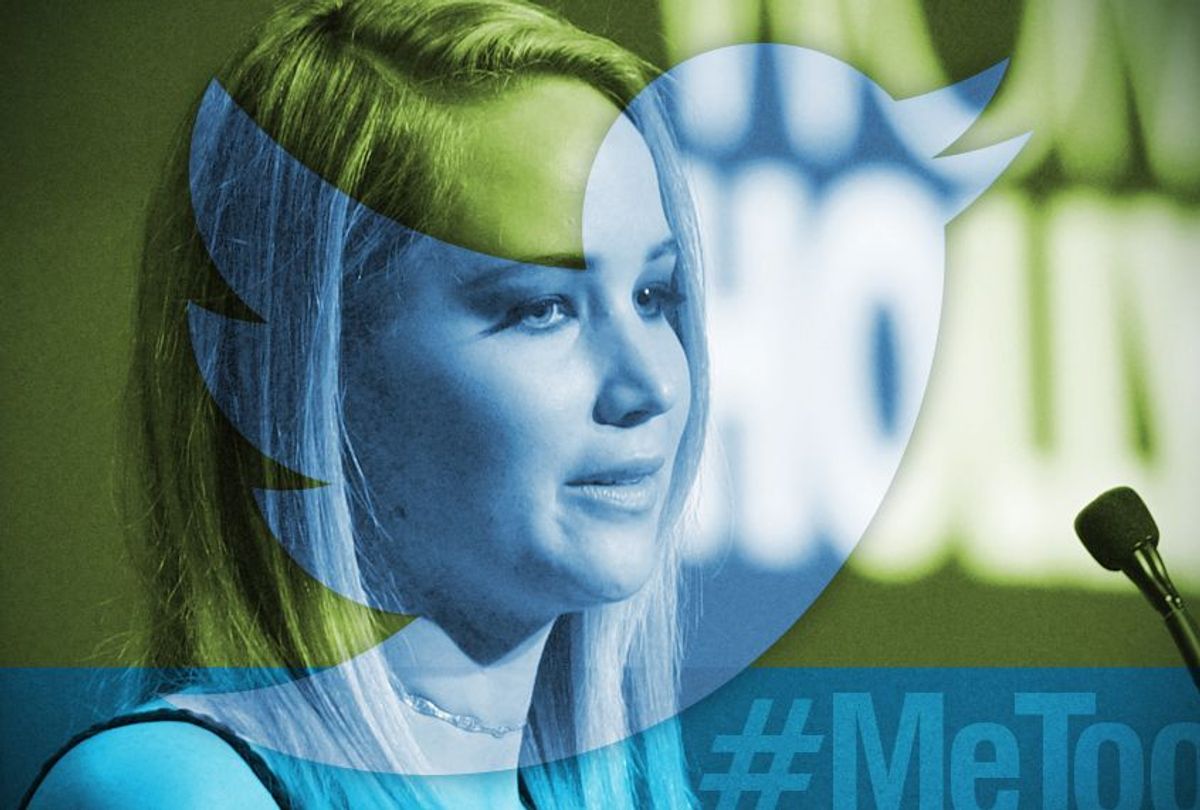Not just a rolling, instantly updated account of the ubiquity of sexual violence, the #MeToo hashtag is providing women a safe, yet public, space to tell their own stories through posting on social media, and to see that they are not alone by just sitting back and reading.
As well, it might — just might — help some men understand that sexual assault is not some distant phenomenon, but a regular part of the lives of the women they love. More than that, it can remind them that it's something they often perpetuate, something only they can truly end. Coming after an ongoing cycle of allegations against Harvey Weinstein and other shocking — but not surprising — revelations, its surging popularity over the last few days feels well placed, even necessary at time.
Yet, the hashtag is no simple thing. It's far from new, either.
While many news outlets credited actor Alyssa Milano for starting the viral hashtag, it was originally a grassroots movement begun a decade ago by activist Tarana Burke with the purpose of connecting sexual assault survivors in underprivileged communities. Burke said that she started the necessary work after she experienced how rape-crisis centers did not go or reach the communities she worked in.
"This was a movement that was started for marginalized people," she told Salon. "This was work that was started for people who didn’t have access to resources and for people whose voices were not listed when we talk about survivors." As she tells it, Burke's vision was less about "amplifying the number of people who are survivors," she said, "but really it's about a conversation between survivors."
Right now that conversation between survivors has been joined by many high-profile actors, something that itself seems a very direct response to the allegations against Weinstein.
Monday night, actor America Ferrara shared her heartbreaking story of sexual assault at age 9 on Instagram. "I told no one and lived with the shame and guilt thinking all along that I, a 9-year-old child, was somehow responsible for the actions of a grown man," Ferrara wrote. "Ladies, let’s break the silence to the next generation of girls won’t have to live with this bullshit."
That same evening, Jennifer Lawrence told a traumatic story of sexual harassment at the Elle Women in Hollywood event. Early in her career, Lawrence said producers pressured her to lose weight. She said one male director quipped: "I don't know why everyone thinks you're fat. I'd sleep with you," according to USA Today.
At the same event, actor Reese Witherspoon also revealed that she was sexually assaulted by a director at the age of 16. She said she feels "disgust" at her assailant and "anger at the agents and the producers who made me feel that silence was a condition of my employment."
Many other stories of sexual violence against celebrities have been uncovered this week. Singers Sheryl Crow, Christina Perri and Lady Gaga, actor Anika Noni Rose, the list goes on. The come on top of a constant stream of new claims against Weinstein (Lena Headey offered hers today).
With the current rise of #MeToo and the fall of Weinstein, have we entered a new time, an era when the cumulative mass of all this sharing, all these stories so difficult to tell, done so often by such high-profile people will have some sort of true and lasting effect?
The New York Times published a story Monday titled "Harvey Weinstein's Fall Opens the Floodgates in Hollywood." The article suggests, in part, that this is a watershed moment for sexual misconduct and rape culture, one that has the potential to shift the paradigm in Hollywood and beyond. But when the Oscar glamour wears off, what will happen to the rest of us?
To an obvious extent, it makes sense that the coverage around #MeToo has revolved around women with fame. Those with Oscar wins and Grammy-decorated records highlight the way celebrity status is only a protective cloak for some powerful men when it comes to cases of sexual violence.
But we've been here many times before, like 10 years ago when Burke first began the movement. The same thing happened two years ago when a similar wave caught on internationally under the hashtag #tellyourstory. We saw the same thing after the allegations against Bill Cosby, and then after Roger Ailes, and then after Bill O'Reilly.
Yes, there are more high-profile voices this time, more Tweets, but is now any different from then? You have to wonder if this space women have carved out online will have any deep impact on the misogynistic culture embedded in Hollywood and the world around it. No matter what powerful figure falls, no matter what hashtags we use, sexual violence always seems to bounce back.
Let's hope the Times is right, that the floodgates are open. But let's hope that for all women — those of us without Oscars and fans, those of us whose names hold no public weight — that those gates stay open.
"It is an epidemic, and the news and media have to treat it like it's an epidemic," Burke said.
"For every R. Kelly, or Bill Cosby, or Harvey Weinstein, there's the owner at the grocery store, the coach, the teacher, the neighbor, who are doing the same things," She told Democracy Now. "But we don't pay attention until it's a big name. We don't pay attention until it's a big celebrity." It's true, we often don't.
But Burke's aware of what's ahead of us when the headlines and hashtags fade, when we start talking about what Lawrence is wearing instead of what she's saying again. "This work is ongoing," she says, "because this is pervasive."

Shares